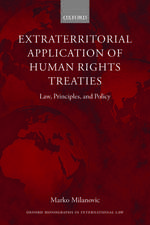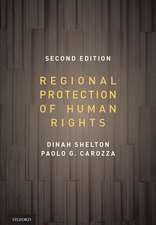The Universalism of Human Rights: Ius Gentium: Comparative Perspectives on Law and Justice, cartea 16
Editat de Rainer Arnolden Limba Engleză Paperback – 20 sep 2014
The book is based on the General and National Reports which were originally presented at the 18th International Congress of the International Academy of Comparative Law in Washington D.C. 2010.
| Toate formatele și edițiile | Preț | Express |
|---|---|---|
| Paperback (1) | 1115.14 lei 6-8 săpt. | |
| SPRINGER NETHERLANDS – 20 sep 2014 | 1115.14 lei 6-8 săpt. | |
| Hardback (1) | 1121.31 lei 6-8 săpt. | |
| SPRINGER NETHERLANDS – 22 aug 2012 | 1121.31 lei 6-8 săpt. |
Din seria Ius Gentium: Comparative Perspectives on Law and Justice
- 20%
 Preț: 1128.16 lei
Preț: 1128.16 lei - 20%
 Preț: 1565.18 lei
Preț: 1565.18 lei - 18%
 Preț: 1115.28 lei
Preț: 1115.28 lei - 18%
 Preț: 904.28 lei
Preț: 904.28 lei - 18%
 Preț: 1001.81 lei
Preț: 1001.81 lei -
 Preț: 180.18 lei
Preț: 180.18 lei - 24%
 Preț: 787.31 lei
Preț: 787.31 lei - 18%
 Preț: 1115.28 lei
Preț: 1115.28 lei - 15%
 Preț: 635.31 lei
Preț: 635.31 lei - 18%
 Preț: 1108.67 lei
Preț: 1108.67 lei - 18%
 Preț: 1007.97 lei
Preț: 1007.97 lei - 18%
 Preț: 784.79 lei
Preț: 784.79 lei - 18%
 Preț: 1223.11 lei
Preț: 1223.11 lei - 18%
 Preț: 891.02 lei
Preț: 891.02 lei - 18%
 Preț: 1009.40 lei
Preț: 1009.40 lei - 18%
 Preț: 1005.74 lei
Preț: 1005.74 lei - 18%
 Preț: 1014.89 lei
Preț: 1014.89 lei - 18%
 Preț: 896.70 lei
Preț: 896.70 lei - 15%
 Preț: 641.85 lei
Preț: 641.85 lei - 18%
 Preț: 779.71 lei
Preț: 779.71 lei - 18%
 Preț: 1010.79 lei
Preț: 1010.79 lei - 18%
 Preț: 1010.03 lei
Preț: 1010.03 lei - 18%
 Preț: 950.52 lei
Preț: 950.52 lei - 15%
 Preț: 638.76 lei
Preț: 638.76 lei - 18%
 Preț: 947.50 lei
Preț: 947.50 lei - 20%
 Preț: 564.78 lei
Preț: 564.78 lei - 18%
 Preț: 939.42 lei
Preț: 939.42 lei - 15%
 Preț: 635.80 lei
Preț: 635.80 lei - 15%
 Preț: 637.59 lei
Preț: 637.59 lei - 15%
 Preț: 643.65 lei
Preț: 643.65 lei - 24%
 Preț: 809.18 lei
Preț: 809.18 lei
Preț: 1115.14 lei
Preț vechi: 1359.93 lei
-18% Nou
Puncte Express: 1673
Preț estimativ în valută:
213.41€ • 231.73$ • 179.26£
213.41€ • 231.73$ • 179.26£
Carte tipărită la comandă
Livrare economică 22 aprilie-06 mai
Preluare comenzi: 021 569.72.76
Specificații
ISBN-13: 9789400792838
ISBN-10: 9400792832
Pagini: 448
Ilustrații: XXIV, 424 p.
Dimensiuni: 155 x 235 x 24 mm
Greutate: 0.63 kg
Ediția:2013
Editura: SPRINGER NETHERLANDS
Colecția Springer
Seria Ius Gentium: Comparative Perspectives on Law and Justice
Locul publicării:Dordrecht, Netherlands
ISBN-10: 9400792832
Pagini: 448
Ilustrații: XXIV, 424 p.
Dimensiuni: 155 x 235 x 24 mm
Greutate: 0.63 kg
Ediția:2013
Editura: SPRINGER NETHERLANDS
Colecția Springer
Seria Ius Gentium: Comparative Perspectives on Law and Justice
Locul publicării:Dordrecht, Netherlands
Public țintă
ResearchCuprins
Introduction.- Chapter 1 Reflections on the Universality of Human Rights; Rainer Arnold.- Chapter 2 Universal Human Rights in the Law of the United States; Mortimer Sellers.- Chapter 3 Diversité culturelle et droits de la personne : la situation au Canada ; Frédérique Sabourin.- Chapter 4 The Impact of the Jurisprudence Inter-American Court of Human Rights on the Chilean Constitutional System; José Ignasio Martínez Estay .- Chapter 5 The Universal Nature of Human Rights: the Brazilian Stance within Latin America’s Human Rights Scenario; Marcelo Figueiredo.- Chapter 6 Cultural Relativism vs. Universalism: the South Pacific Reality; Jennifer Corrin.- Chapter 7 Implementation of Universal Human Rights Standards in Japan: An Interface of National and International Law; Kohki Abe.- Chapter 8 Human Rights as the Basis for a New Chinese Constitutionalism; Mo Jihong.- Chapter 9 Who Is Afraid of Human Rights? A Taiwanese Perspective; Yean-Sen Teng.- Chapter 10 Russia’s Approach to the Universality of Human Rights; Daria Trenina and Mark Entin.- Chapter 11 The Legal and Constitutional Impact of the European Convention on Human Rights in the United Kingdom; Steven Greer .- Chapter 12 The Binding Effect of ECHR in the United Kingdom - Views from Scotland; Jim Murdoch.- Chapter 13 The Struggle over the Interpretative Authority: the Belgian Experience; Matthias Storme.- Chapter 14 The Role of Human Rights in the Dutch Legal Order; Cedric Ryngaert.- Chapter 15 Rule of Law as a Basis for Effective Human Rights Protection: the German Perspective.- Norman Weiß.- Chapter 16 From the Rights of Citizen to Fundamental Rights of Man: The Italian Experience.- Alessandro Pace.- Chapter 17 Le juge en tant que défendeur des droits de l'homme: les observations grecques ; Michail Vrontakis.- Chapter 18 Universality and Binding Effect of Human Rights from a Portuguese Perspective; Ana Maria Guerra Martins and Miguel Prata Roque.- Chapter 19 Human Rights in Times ofGlobal Inequalities. A View from Slovakia; Darina Macková.- Chapter 20 Human Rights as a Pillar of Transformation: a Polish Perspective; Ewa Łętowska.- Chapter 21 Human Rights Protection in a New EU Member State: the Czech Example; Pavel Šturma.- Chapter 22 Multidimensional Protection of Universal Human Rights in Hungary; Nóra Chronowski, Tímea Drinóczi and József Petrétei.- Chapter 23 Croatia: Developing Judicial Culture of Fundamental Rights; Siniša Rodin.- Chapter 24 The Implementation of Human Rights Universality Principle in Ukraine; Alla Fedorova and Olena Sviatun.- Index.
Textul de pe ultima copertă
Is there universalism of human rights? If so, what are its scope and limits? This book is a doctrinal attempt to define universalism of human rights, as well as its scope and limits. The book presents tests of universalism on international, regional and national constitutional levels. It is maintained that universalism of human rights is both a ‘concept’ and a ‘normative reality’. The normative character of human rights is scrutinized through the study of international and regional agreements as well as national constitutions. As a consequence, limitations of normativity are identified, usually on the international level, and take the form of exceptions, reservations, and interpretations.
The book is based on the General and National Reports which were originally presented at the 18th International Congress of the International Academy of Comparative Law in Washington D.C. 2010.
The book is based on the General and National Reports which were originally presented at the 18th International Congress of the International Academy of Comparative Law in Washington D.C. 2010.
Caracteristici
A current analysis of the international human rights legal situation that will be of interest to top level academics world wide An integrated three level perspective which until now has not been developed in this context A unique comparative study in a regional and national perspectives














